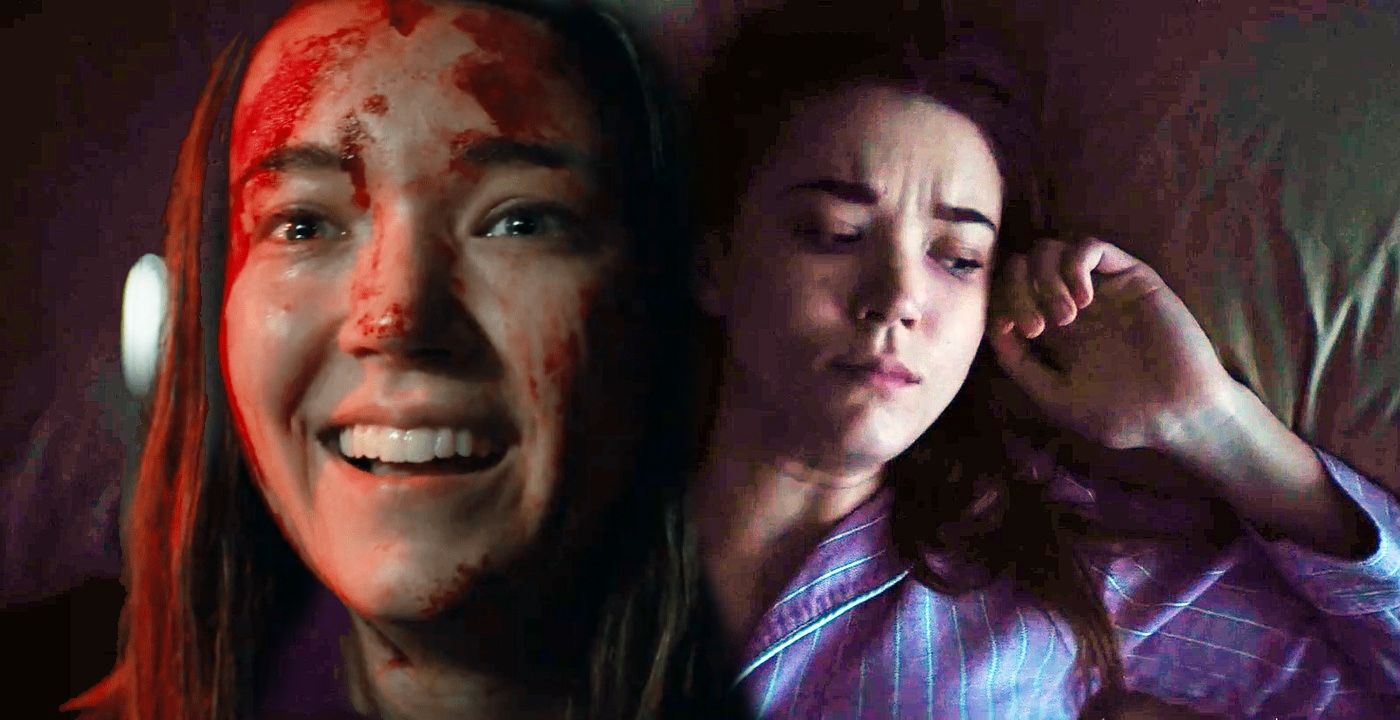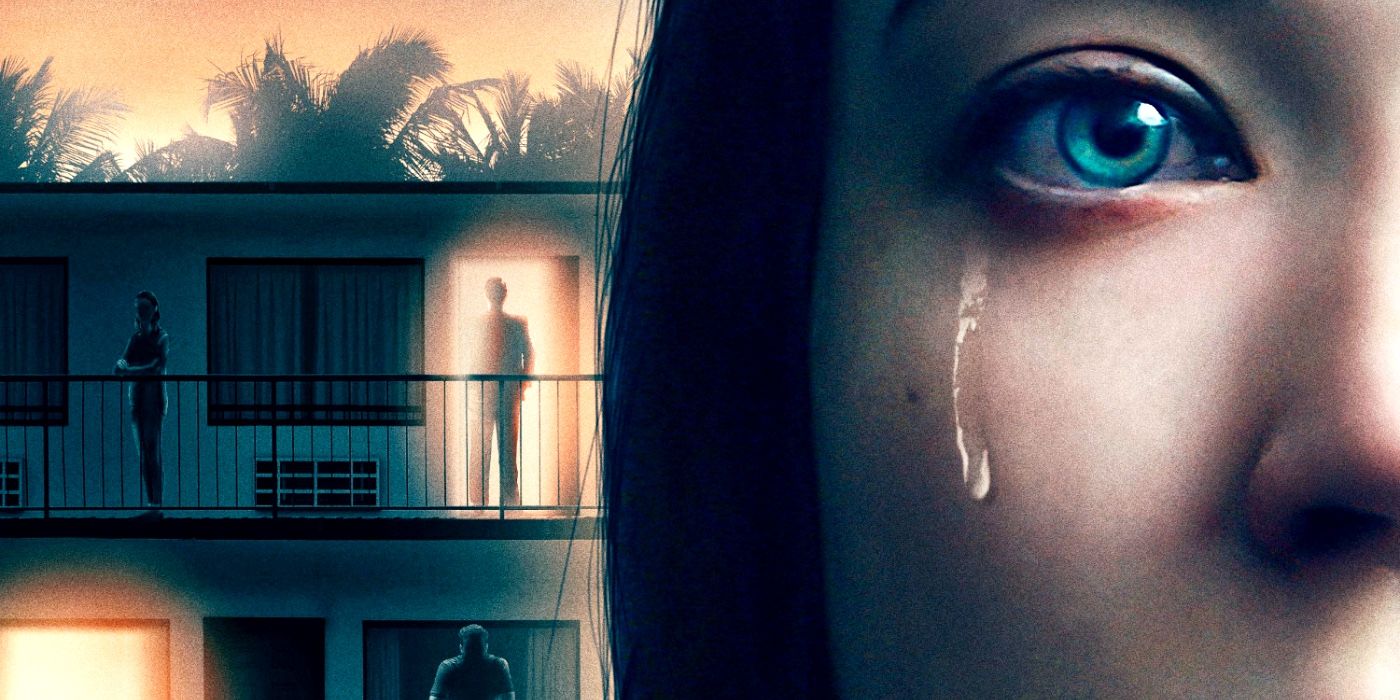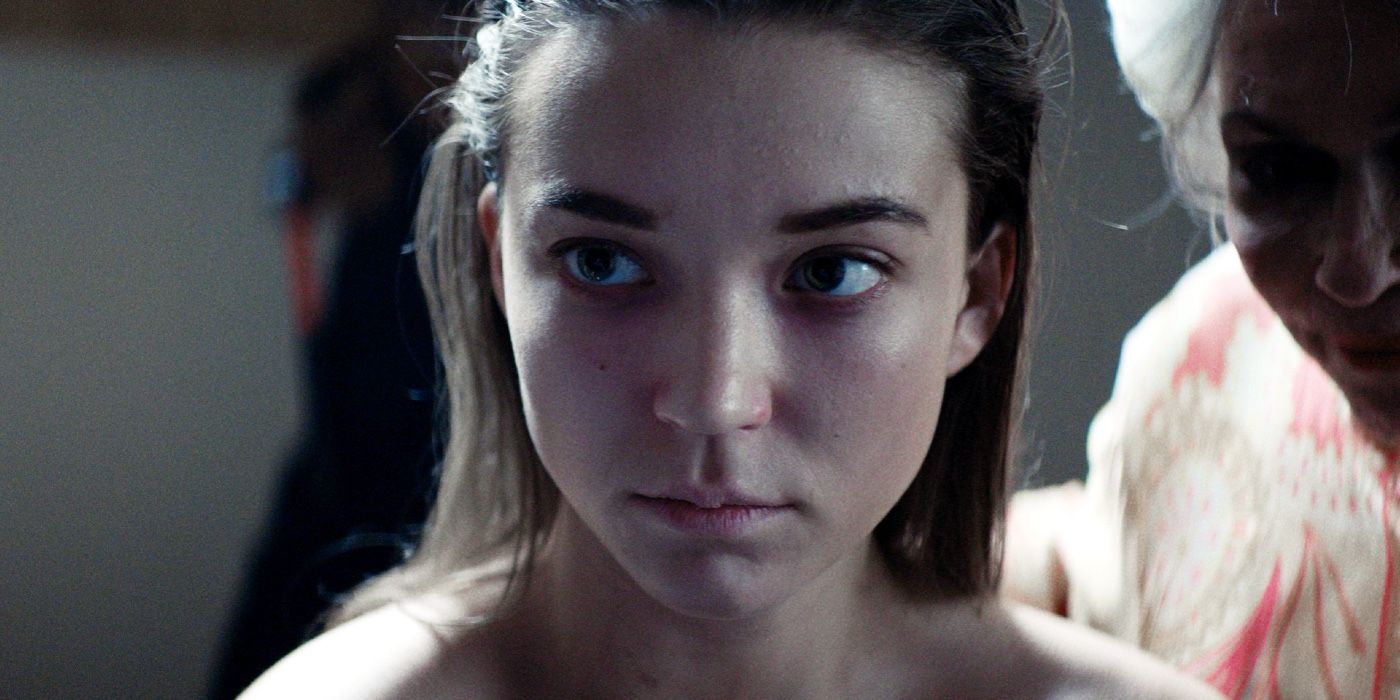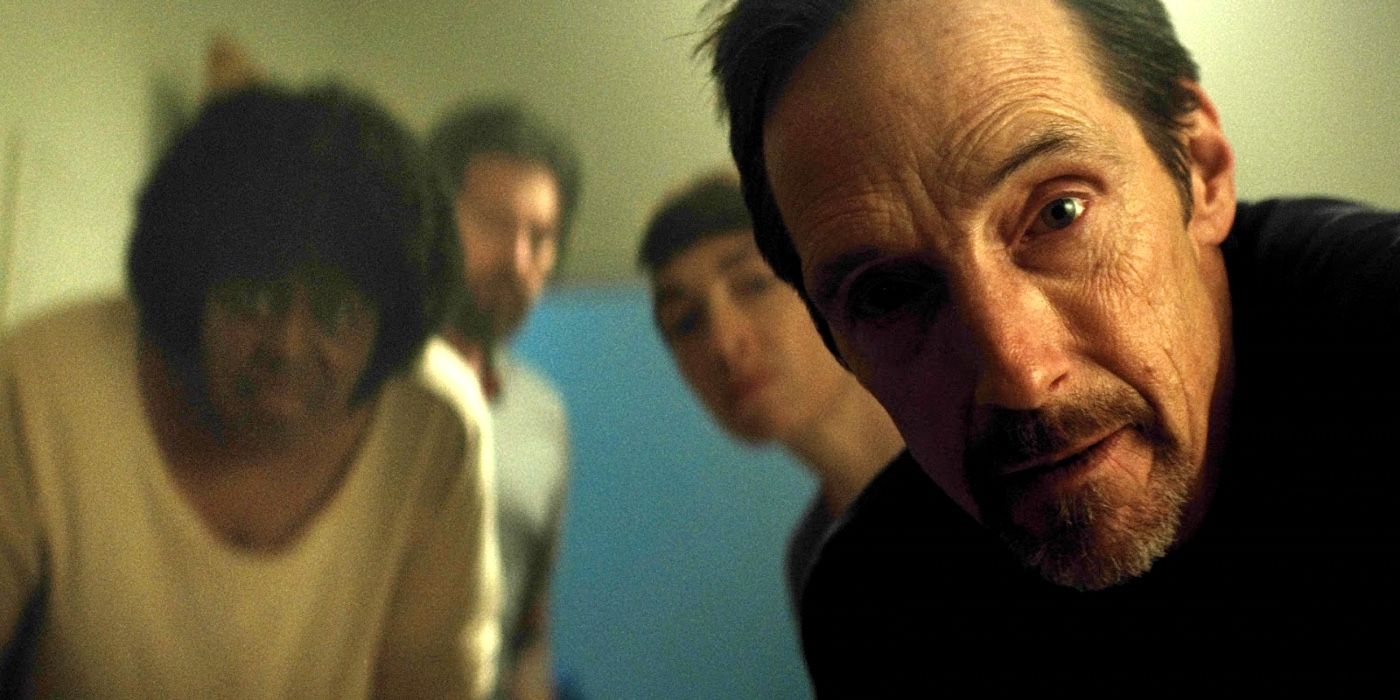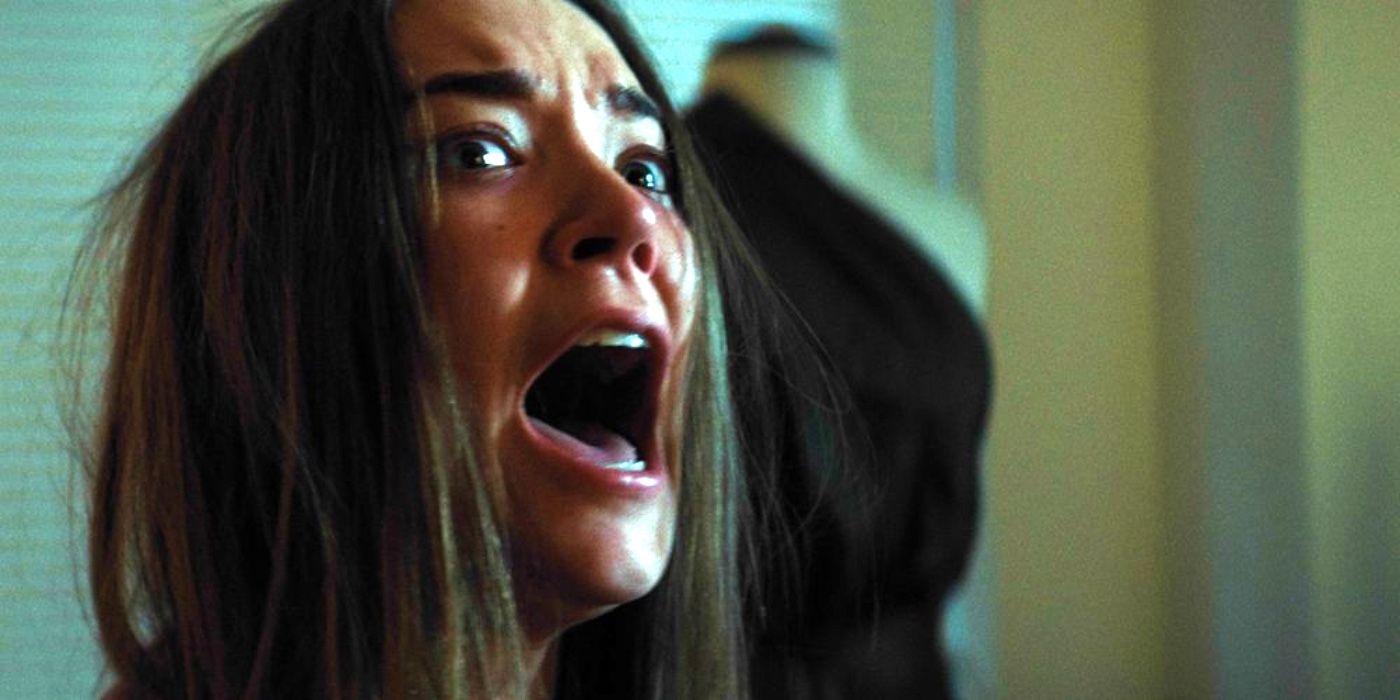WARNING! Spoilers for 1BR ahead.
Director David Marmor's psychological thriller, 1BR, packs a punch with its twist ending that leaves audiences questioning the real meaning of the film — here is the 1BR movie ending explained. Starring Nicole Brydon Bloom as Sarah, a young woman who leaves her old life and her estranged father (Alan Blumenfield) behind to start over in sunny Los Angeles, the movie explores the dark side of a seemingly idyllic community. Taking notes from other social thrillers like Jordan Peele's Get Out, 1BR has a message for Gen Z and Millennials who are searching to find their place and set out alone: sometimes what seems too good to be true is.
Though not as heavy with political messaging as some other social horror movies of the 21st century, 1BR still manages to establish itself as a cautionary tale that urges viewers to consider how life choices can be isolating — and often so isolating that they, in turn, can become the perfect victim. A sleek, 90-minute run-time sets the 1BR movie up for its poignant and downright depressing ending. However, the 1BR ending is ambiguous, leaving audiences with questions about what the greater purpose of Sarah's newfound community — which is really more like a cult — is and what will happen to her after the credits roll.
1BR's Ending: What Do The Red Lights Mean?
The final scene of the 1BR movie sees Sarah escaping the clutches of her community members, who have warped her mind through the use of operant conditioning and forced her to assimilate into their four tenets in order to create the perfect society. These tenets are: selflessness, openness, acceptance, and security. After reading a book by a famed psychologist—who was convinced he'd discovered a way to create a more harmonious, successful society—she seemed to accept her fate and her new life. Sarah was even placed into an arranged marriage of sorts with Lester (Clayton Hoff), who had lost his wife to cancer.
According to their leader, Jerry (Taylor Nichols), being Lester's wife would be the perfect way for Sarah to contribute to their community. As she walks down a dimly lit street in her neighborhood in the 1BR movie, she notices cameras on a nearby building, then makes a horrible discovery: most of the apartment complexes on her block are all run by the same company. This draws a similar parallel to Karyn Kusama's 2016 thriller, The Invitation, where the events that transpired at one dinner party were really just one of many suicide cult gatherings to happen on that evening—the other houses were all marked with the same, eerie red lanterns.
The 1BR movie has a similar effect when Sarah sees all the buildings on the block lighting up with red lights and blaring alarms; as it was left ambiguous as to who is controlling all these communities, it seems like everyone in the greater web has been notified about her escape. Whether this means they'll come to collect her and attempt to assimilate her into her community again, put her in a new community, or mark her as a threat and just kill her is unknown, but the red lights that signify that her group was only one of many leaves a lasting impression in the movie's final frames.
1BR: What Will Happen To Sarah?
Given Sarah's escape in the 1BR ending, she either was able to break free of her conditioning or never fully took to it in the first place. Though she turned away her father after he came to check on her and likely ruined their relationship for good, it's very possible that she'll never make it home to repair their bond. The 1BR movie could very well have set itself up for a sequel, though likely not with Sarah — more likely, she'll be re-captured and killed. However, given the community's focus on keeping everyone as part of the group until the very end, they might try to capture her alive.
This dedication to community — and the likelihood that only death can allow someone to leave for good — was proven by Edith's (Susan Davis) death. As the 1BR ending explained, she willingly allowed herself to be killed for the "betterment" of the group, just like the elders in Midsommar. Though certainly a selfless act, it shows the misplaced morality that the community holds dear and how corruption can taint even the best of intentions. Because they seem so keen on togetherness, even though Sarah killed Jerry and Brian (Giles Matthey), she might still be brought back into the fold by force.
Either way, she's a definite risk — unless the organization spreads far beyond what the scope of the 1BR movie explored and has extended to police and other officials, her telling other people what was happening could bring down the entire group. The fact that Brian and Jerry wanted Sarah to ensure that her father never came sniffing around the apartment complex again—or they'd kill him—points to the likelihood that they're still a relatively secretive organization, an underground cult that hasn't yet extended to greater power, but could in time that follows. Already, they've taken over a neighborhood, so it's only a matter of time.
What 1BR's Ending Really Means
The focus on creating something akin to a Utopian community is the centerpiece of the apartment complex's residents, as the 1BR ending explained. They all seem to be longing for a better life, a stronger sense of togetherness, a way to shut out the world's selfish ills and problems that are often cited as detriments to civilized society. Like in the ending of Get Out, where the Armitage family performs experiments on Black people to give white people some greater advantage in life, the residents of Sarah's apartment complex are initially delighted to see her.
At first, it seems like they're just glad to have fresh blood around in the 1BR movie — this isn't an out-of-place assessment. Sarah is young, vibrant, and eager to care for the older residents of the community, like Edith. She shows a natural knack for helpfulness and, in a community where many of the residents are older than Sarah, this can be seen as a draw. So many young people are disconnected from society, tethered to social media, cell phones, and too stuck on their own needs to naturally be inclined toward helping others.
As the 1BR ending explained, by inducting young people like Sarah into the fold, the community can eventually help to recruit and assimilate other people—they can ensure their legacy lives on long after they are gone. Jerry says to Sarah that the purpose is to help people, to heal the world. It's a sinister thought that, through the use of operant conditioning to essentially brainwash people into desperately wanting to become part of this Midsommar-type cult-like mentality that is good in theory—but so harmful in practice—they can create a better world.
Ultimately, Sarah chooses to live her life and embrace her freedom—her individuality—even if she has to pay the ultimate price, and doesn't survive. The 1BR movie explores how a dark road can be paved with good intentions, but losing sight of one's own morals and sense of self—the guiding principles that bolster each and every human being on the planet—is a fate worse than death.
How Director David Mamor Explains The 1BR Ending And Meaning
1BR movie director David Mamor recently opened up to Eye For Film in an interview about the production process as a whole, as well as the 1BR ending and what his overall goal was. Reportedly, 1BR didn't have the easiest time being made. Production was shut down because LA wildfires threatened one of the apartment buildings they planned on filming in, and three lead cast members dropped out of the movie just days before filming was set to begin. Thankfully, newcomer Nicole Brydon Bloom's casting saved the production, with Mamor admitting, "I’m not sure we would have finished the movie if we didn’t have her in that role."
Sarah's experience of loss and isolation is what drives the 1BR movie forward, as Mamor admitted he based the location off of the very first apartment complex he inhabited in LA. He wrote a version of 1BR at the time, and then shelved it for a later date. He dug the project back out when he found nothing else struck his fancy and purposefully leaned into the atypical horror aspects of the story. Mamor didn't want to make a typical escape film. Rather, he wanted to zero in on Sarah's indoctrination process and her involvement with the community as a whole. His full sentiments about 1BR can be read below.
It was really important to me that this wasn’t going to be a movie about her physically trying to escape. It wasn’t going to be, like, can she get the key or can she defeat this security system or whatever. It was important to me to create a perfect cage that would feel completely inescapable, so that you wouldn’t be sitting there thinking ‘But wait, what if she does this...’ because that wasn’t what it was about. She had to mentally escape. So that was the rationale behind it, to create that kind of trap for her.

